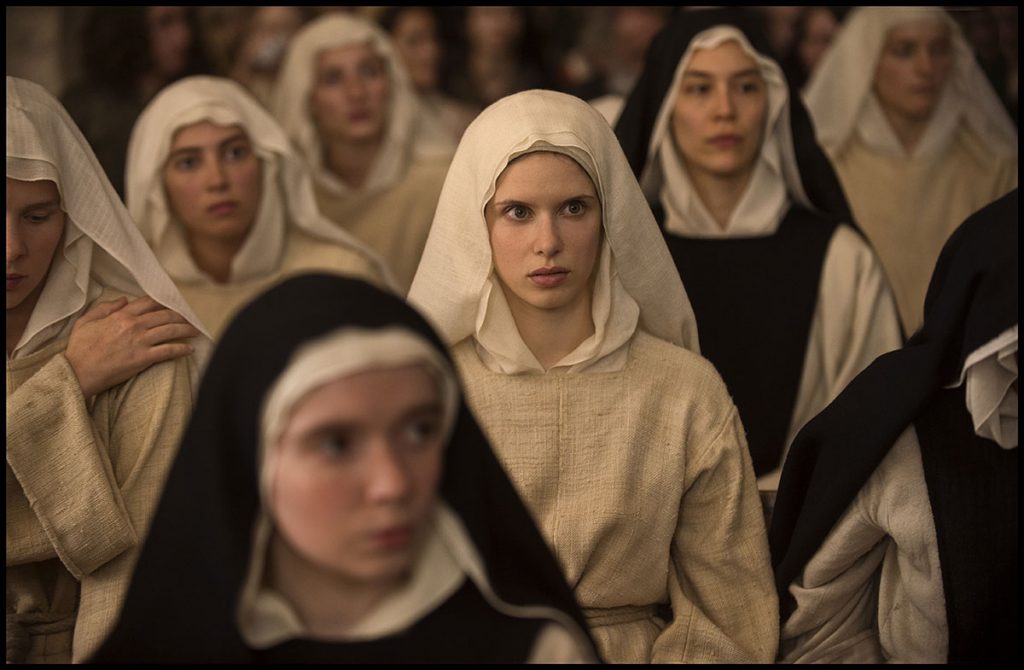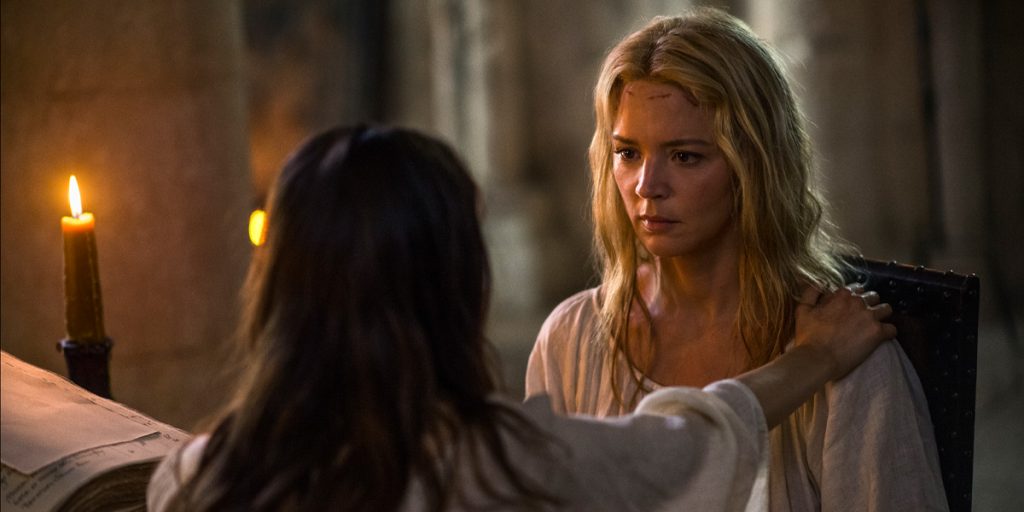Benedetta is a thrilling and intimate tale providing uncompromised entertainment with scathing commentary; a welcome addition to the veteran’s canon.
Paul Verhoeven’s latest film stars Virginie Efira (who had a small role in 2016’s Elle) as Benedetta, a revered nun who attempts to hide her taboo love affair with another nun from the rest of her Tuscan convent. Meanwhile, she sees intrusive, frightening visions of Jesus, and is increasingly threatened by the prospect of her love becoming known – knowing full well the grave consequences should this happen. The film is loosely based on a true story, chronicled in Judith C. Brown’s 1986 book “Immodest Acts: The Life of a Lesbian Nun in Renaissance Italy”, but takes several liberties, featuring several fantastical elements that helps create a sense of magical realism. Set in Tuscany and with French dialogue, it competed earlier this year for the Palme d’Or.
If you like Paul Verhoeven, you are going to enjoy Benedetta. The film offers biting satire on the Catholic Church and is full of intrigue, action, and comedy. Its satire isn’t thinly veiled at all (no pun intended; or should I say, nun intended), but this did not bother me because it is not purporting to be groundbreaking or particularly clever. Verhoeven pokes fun at the Church’s structure with the devout, genuine practitioners being not only servants of God but also servants of the greedy, money-obsessed superiors.
Benedetta is adored. What has made Benedetta a subject of borderline worship since birth is not really elaborated upon; the film begins with a flashback from her childhood that portrays her as a mythic, almost magical being that is celebrated by the adults in her life, but we don’t really know why; like a fantasy film, we are thrown into a world and expected to take certain things for granted. Thanks to strong acting and meticulous world-building, I found this very plausible, and the more overtly fantastical elements (mainly Benedetta’s visions of Jesus, where she often adopts his role but is much more judgmental and scornful) add to the sense that we’re not to take everything at face value. This is one of the film’s biggest strengths; it doesn’t take itself too seriously, and I even read these moments as potentially communicating mental illness. At the beginning of the film, an idyllic childhood scene is interrupted by villains. A potential antagonist is humiliated by bird mess (a la Brewster McCloud) and others are fended off much more violently. You get the feeling that Benedetta is somehow sacred because everything conspires to protect her.

We then jump eighteen years, and meet Bartolomea (Daphne Patakia), Benedetta’s love interest. You first see her trying to escape her abusive father for the convent, who, after some deliberation, agrees to effectively buy her from him in exchange for her devotion to their faith. There is a stark contrast in the two women: Benedetta is almost superhuman, and has been treated as such her whole life, especially in her most formative years, whereas Bartolomea has only suffered and been humiliated, and the convent is a refuge for her. Their dynamic is cultivated excellently by the effervescent chemistry of Efira and Patakia. People will of course compare this to the chemistry of Noémie Merlant and Adèle Haenel in Portrait of a Lady of Fire; the obvious comparison to most, of course, for a French period drama about two female lovers. Charlotte Rampling is also brilliant as The Abbess, whose favourite part of her position is the authority it gives her.
The director, whose past works include RoboCop, Basic Instinct, Showgirls and Black Book, is venerated for making films with lots of sex and violence, while actually using it to make a point. It’s not merely for cheap popcorn entertainment or lurid, exploitative thrills, but here serves a purpose within the story because it is not only taboo in wider society at the time but is especially so in the convent. These are private expressions of love, which do not harm anybody, yet they do not conform to what is ‘acceptable’. They all believe that God knows what everyone does privately, but if nobody knows how Benedetta and Bartolomea feel about each other, then each of them will be treated better. This is what’s so funny, and what’s so telling about the environment they live in. When you’re hyper-moralistic, it’s easy to make knee-jerk reactions and jump to conclusions. But everybody has secrets, and if you don’t know about certain aspects of a person, it colours your judgment.
Looking at the film from a feminist perspective, the film presents a ‘strong’ female protagonist that contrasts with Hollywood’s two-dimensional heroines in many ways. But Benedetta is not a hero. Virginie Efira spoke briefly before the screening (at the Royal Festival Hall for London Film Festival), saying that one of her favourite things about Verhoeven is his refusal to deal in clear-cut hero/villain dichotomy. Everyone is nuanced in this film, yet some people are worse than others. Benedetta knows her desires and knows how to get what she wants. She is manipulative and her physical beauty is only a small part of her arsenal. Whereas a more mainstream film would likely reduce the story merely to the sexual aspects for cheap exploitation, the film depicts the love as only one part of Benedetta’s life, and as the only expression she can really get of true emotion due to the nature of her position in the convent. What I like so much about her character is her ambiguous morality; she is selfish, she is controlling and at one point very cruel towards Bartolomea, forcing her to hurt herself for a trivial reason, but she never seems so bad because in the background she is surrounded by people who are so much worse, and have more authority.
Perhaps the most surprising element of the film is the comedy; I was not expecting so many funny moments and lines. It seems every other scene has at least one laugh-out-loud moment, and it’s relentless in how it takes aim at the hypocrisy of an institution which countless people have devoted their lives to over many hundred years. One of the most well-received comic moments was when a statue of the Virgin Mary falls on a young Benedetta while she is praying to it, and she is awkwardly pinned down by it, and it looks like she is kissing it. Verhoeven’s keenness to play with religious iconography may not be particularly daring today as it was in the days of Ken Russell, but it’s still very funny.
I couldn’t really identify any major flaws. The film is well-paced, with every scene contributing to the wider whole, and while it’s tonally a bit all over the place, the pathos and comedy still mesh very well together because they are so perfectly timed in the script and translated to screen by suitable actors. I won’t talk about the ending to avoid spoiling it, but I do feel that the film concludes in a satisfying way that does justice to everything that precedes it, because it is consistent with Benedetta’s character and is a natural culmination of past events. The film is insightful and entertaining all the way through. Benedetta has been released in France already but isn’t out until December in the U.S.A. and March in the UK; I strongly recommend you see it!
Benedetta was screened at the London Film Festival on 16-17 October, 2021 and is now available to watch on digital and on demand. Read our review of Paul Verhoeven’s Total Recall.

